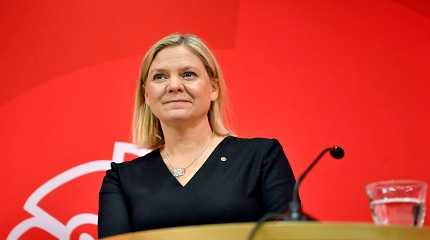
STOCKHOLM (AP) — Sweden is holding an election Sunday expected to boost a populist anti-immigration party that promises to crack down on shootings and other gang violence that have shaken many people’s sense of security.
The Sweden Democrats entered parliament in 2010 and have steadily gained more votes with each election. The party’s fortunes have risen following massive migration in recent years, particularly in Europe’s crisis year of 2015, and as crime has grown in segregated neighborhoods.
The party has its roots in the white nationalist movement but many years ago began expelling extremists. Despite its rebranding, voters long viewed it as unacceptable and other parties shunned it. That is changing.
Polls predicted the Sweden Democrats, which won 13% in 2018, would take about 20% Sunday to become the second-largest party in the parliament. That would put it only behind the center-left Social Democrats of Prime Minister Magdalena Andersson.
Andersson, a 55-year-old economist, enjoys high approval ratings. She became Sweden’s first female prime minister less than a year ago and led Sweden’s historic bid to join NATO following Russia’s invasion of Ukraine.
Zeth Isaksson, a specialist in electoral behavior at Stockholm University, said she is highly trusted thanks to her experience in government, first as finance minister, through crises including the COVID-19 pandemic and, as prime minister, in the negotiations to join NATO.
“Magdalena Andersson is one of the most important factors in this election,” Isaksson told The Associated Press.
At rallies, her supporters have worn T-shirts and pins with her image modeled after the stylized “Hope” poster of former President Barack Obama.
But hope is precisely what some no longer have in her party after its eight years in power. They blame it for high taxes and for failing to stem the shootings that have made Sweden one of Europe’s most violent countries.
“She has had eight years to do everything that she’s now saying she’s going to do,” said Bosse Adolfsson, a 70-year-old partly retired electrician at a Sweden Democrats rally on Saturday. “She is asking for four more years to not do anything.”
There are two major blocs, with four left-wing parties and four conservative parties. The polls leading up to the election showed the blocs running neck and neck.
If the left-wing bloc does poorly overall, Andersson might not be able to form a government with a majority in parliament. The party in second place would then get to try.
Traditionally, that would be the center-right Moderates. Though the party risks being outvoted by the populists, their leader, Ulf Kristersson, currently the main opposition leader, is seen as the likely prime minister candidate should the right prevail. He ran on a pledge of “Sweden needs change.”
The populists’ leader Jimmie Akesson still is not considered a prime minister candidate given the party’s historical roots.
The Moderates’ expected third-place showing “shifts everything upside down,” said Torbjorn Sjostrom, CEO of the polling institute Novus. “The Swedish Democrats have increased for every election quite substantially, slowly moving into the warmth of being a serious party in Sweden, and they therefore would expect more influence.”
He said his polling research shows that those who vote for the Sweden Democrats are often blue collar workers, and that twice as many men as women support it.
“It’s basically the same as you see in most traditional populist parties, even in the Trump voter,” he said, explaining that the party resonates largely with people “who are afraid of their own safety and the future.”
Andersson has voiced alarm at the rising popularity of the Sweden Democrats, characterizing it as a “far-right” party that, if it wins influence in government, could erode Sweden’s identity as a place of tolerance and of refuge for the persecuted.
“It could be a different Sweden that we could have in four years,” she said.
The Sweden Democrats have clearly tapped into the anxieties of many, and other parties have been moving closer to its positions. Many Swedes agree that their country can no longer bear the costs of the country’s generous refugee policies of the past.
Tobias Andersson, a 26-year-old member of parliament for the Sweden Democrats seeking a second term, said his party is being unfairly characterized as racist by opponents because it serves their interests.
“I wasn’t even born when my party was founded, I don’t really care who founded it. I look at the values and policies that we support today,” he told the AP.
He said politicians who have called the Sweden Democrats racist are now “pushing forward the same policies themselves.”
Most Swedes still oppose them, and some were voting tactically against any right-wing party to prevent that side from getting a chance to wield power.
Voting in Stockholm, Bjarne Frykholm, a 65-year-old computer specialist wouldn’t say who he voted for other than to make clear he opposed the Sweden Democrats.
“I don’t want them to get any power at all,” he said. “I think they frighten me a lot.”




